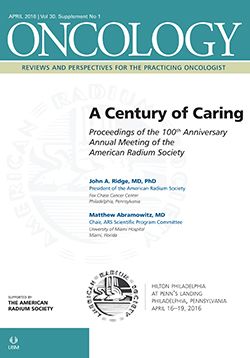(P021) Delivery and Outcomes of Adjuvant Radiation Therapy in Older Women With Node-Positive Vulvar Cancer
In this cohort of older women with node-positive vulvar cancer, adjuvant RT is associated with improved OS, though overall outcomes are poor. More reliable delivery of quality RT may further improve survival in this population.
Cameron W. Swanick, MD, Grace L. Smith, MD, PhD, MPH, Jinhai Huo, PhD, MD, MPH, Larissa A. Meyer, MD, Patricia J. Eifel, MD; UT MD Anderson Cancer Center
PURPOSE: We examined postoperative radiation therapy (RT) use, clinical outcomes, and indicators of the quality of RT delivered in vulvar cancer patients with node-positive disease.
METHODS: Using the Surveillance, Epidemiology, and End Results–Medicare linked database, we identified 519 patients (aged ≥ 66 yr) with nonmetastatic node-positive vulvar cancer treated with primary surgery from 1991–2009. Procedure claims identified adjuvant RT. We tested associations between RT use and overall survival (OS) as well as cause-specific survival (CSS) using proportional hazards regression. Among patients treated with RT, we described benchmarks of quality based on: (1) treatment completion of ≥ 20 fractions; (2) treatment duration < 8 weeks; (3) no treatment break > 5 days per 12 elapsed days; and (4) no RT delay, based on the interval from surgery to start of treatment of < 8 weeks.
RESULTS: Sixty-seven percent of patients (n = 349) received adjuvant RT. On multivariable analysis, RT was associated with improved OS compared with surgery alone (hazard ratio [HR], 0.71 [95% CI, 0.57–0.88]; P = .002), with a trend toward improved CSS (HR, 0.79 [95% CI, 0.59–1.05]; P = .11). OS and CSS were improved in patients who received ≥ 20 fractions (3-year OS: 34% vs 26%, P = .008; 3-year CSS: 48% vs 37%, P = .03). There were absolute, but not significant, improvements in OS and CSS in patients who completed RT in < 8 weeks (3-year OS: 33% vs 27%, P = .13; 3-year CSS: 46% vs 39%, P = .10) and had < 5 days of treatment break per 12 elapsed days (3-year OS: 31% vs 29%, P = .84; 3-year CSS: 48% vs 38%, P = .24). An interval from surgery to RT of < 8 weeks was not associated with improved outcomes. Only 23% of patients who received RT met all four benchmarks.
CONCLUSIONS: In this cohort of older women with node-positive vulvar cancer, adjuvant RT is associated with improved OS, though overall outcomes are poor. More reliable delivery of quality RT may further improve survival in this population.
Proceedings of the 98th Annual Meeting of the American Radium Society - americanradiumsociety.org
